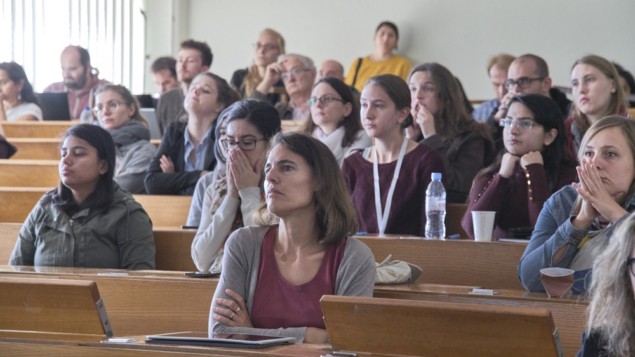
More than 3000 physicists have so far signed an open statement denouncing a recent talk by theoretical physicist Alessandro Strumia of the University of Pisa. The talk was given on 28 September at an inaugural CERN workshop on high-energy theory and gender in which he claimed that men, not women, face discrimination when seeking jobs in physics. The statement, which has been signed by Nobel laureate David Gross and other prominent scientists, calls Strumia’s arguments “morally reprehensible”.
Strumia’s presentation at CERN included graphs and tables that analyse the citation records of papers written by male and female physicists. In the talk, he stated that these data show that “top authors are man, man,…man”. He also claimed that data related to academic hiring show that women with fewer citations were being hired over men with greater numbers of citations. In one slide, Strumia, who is an associate of the theory department at CERN, claims that he was passed over for a job at Italy’s National Institute for Nuclear Physics, despite having many more citations than the successful female candidate. The woman in question was in the audience at Strumia’s talk.
Belittling the ability and legitimacy of scientists of colour and white women scientists using such flimsy pretexts is disgraceful
Particles for Justice statement
Following the presentation, CERN removed a video of it from the lab’s website along with Strumia’s slides and released a statement describing it as “highly offensive”. CERN then suspended Strumia from any activity at CERN with immediate effect, pending an investigation into his presentation. “CERN, like many members of the community, considers that the presentation, with its attacks on individuals, was unacceptable in any professional context and was contrary to the CERN Code of Conduct,” a statement from the Geneva-based lab says. On 1 October the University of Pisa also opened an ethical investigation in Strumia’s behaviour.
In a statement on 3 October (and updated on 5 October), CERN director general Fabiola Gianotti and CERN theorist Gian Giudice, who co-organized the meeting, says it is “disappointing” that the workshop had been “overshadowed by one speaker who made statements contrary to the ideals on which CERN is based”. It adds that Strumia “used his presentation to make unacceptable personal allegations against individuals attending the workshop, which is why we have been obliged to take action”.
“Fundamentally unsound”
On 4 October, 18 physicists including Sean Carroll from the California Institute of Technology and Chanda Prescod-Weinstein from the University of Washington and the University of New Hampshire, published a statement noting they were “appalled” by Strumia’s actions and views on women in high-energy physics. “The thin veneer of scientific rigour with which Strumia’s talk began was followed by open discrimination and personal attacks, which we condemn unconditionally,” it says.
They point out that the science case presented by Strumia was “fundamentally unsound” adding that he misused his physics credentials to put himself forward as an expert on gender studies. “He fundamentally made the basic error of conflating correlation with causation, and while Strumia claimed to be proving that there is no discrimination against women, his arguments were rooted in a circumscribed, biased reading of the data available, to the point of promoting a perspective that is biased against women,” the statement says.
The statement then offered eight examples in his presentation where alternative conclusions could be drawn. In one of those points, the authors take aim at Strumia’s claim that since the most cited papers are disproportionately by men, this gives evidence that men are intrinsically better at physics. “In between intrinsic ability and citation counting however, there is the huge and complicated process of how physicists are raised, trained, hired, and perceived,” the statement says. “Even at the professorial level, discrimination can still play an important role.” They add that without a thorough understanding of such processes, “it is impossible to conclude anything about people’s innate abilities”.
“Belittling the ability and legitimacy of scientists of colour and white women scientists using such flimsy pretexts is disgraceful,” the statement notes. “It will add to the obstacles that women and gender minorities, as well as men from traditional underrepresented communities, struggle with on a daily basis.” The five-page statement concludes by hoping that speakers at future workshops on gender and other ascribed identities should include “recognized” experts who have a track record of speaking and publishing in such areas. CERN describes physicist’s gender talk as ‘highly offensive’
In an e-mail to Physics World, Strumia says the authors of the statement are a “US-centric small fraction of the physics community [that] defends the gender theory which is mainstream in ‘politically-correct’ academias [sic]”. He adds that the authors of the letter “don’t mention the alternative theory which I summarized because it can fit the data, which is what matters in science [rather than] claiming that deplorables should be fired.” Strumia also complains that the authors do not link to his slides and that it is “false” that he belittles the ability and legitimacy of scientists of colour.




